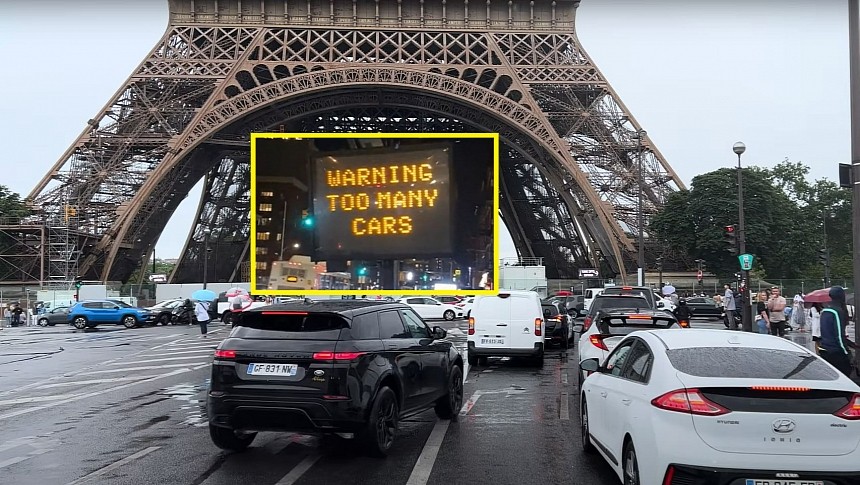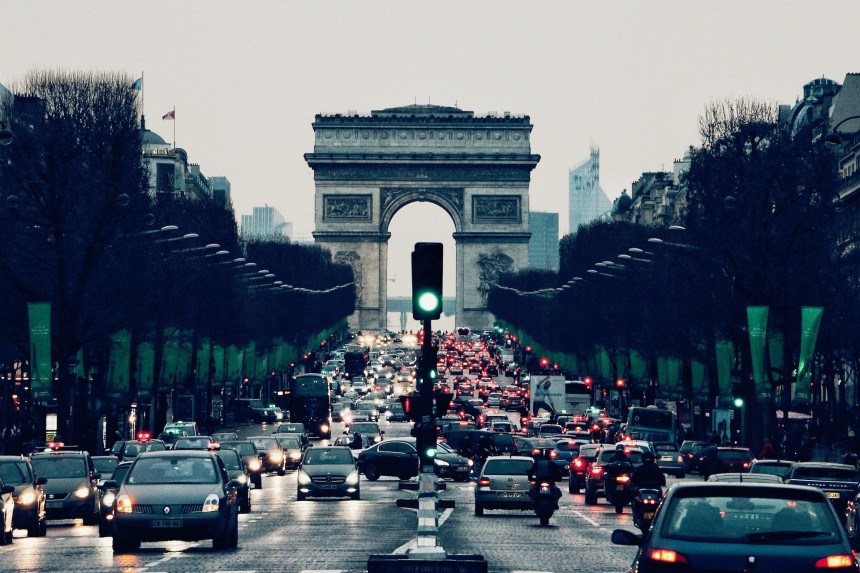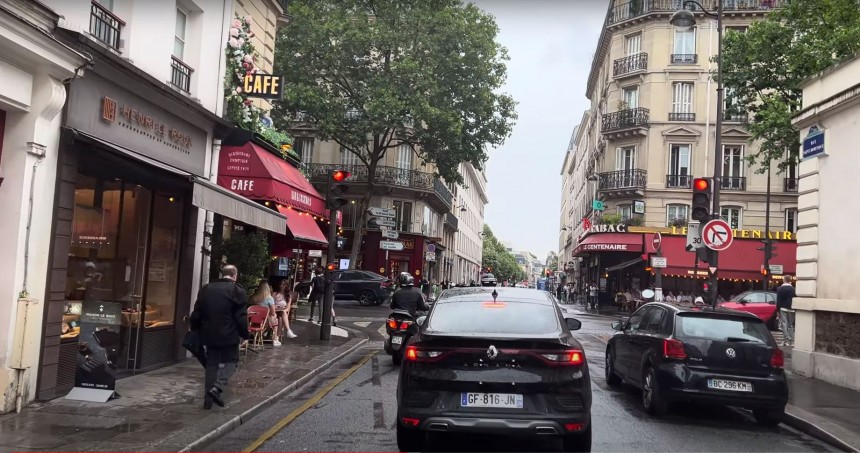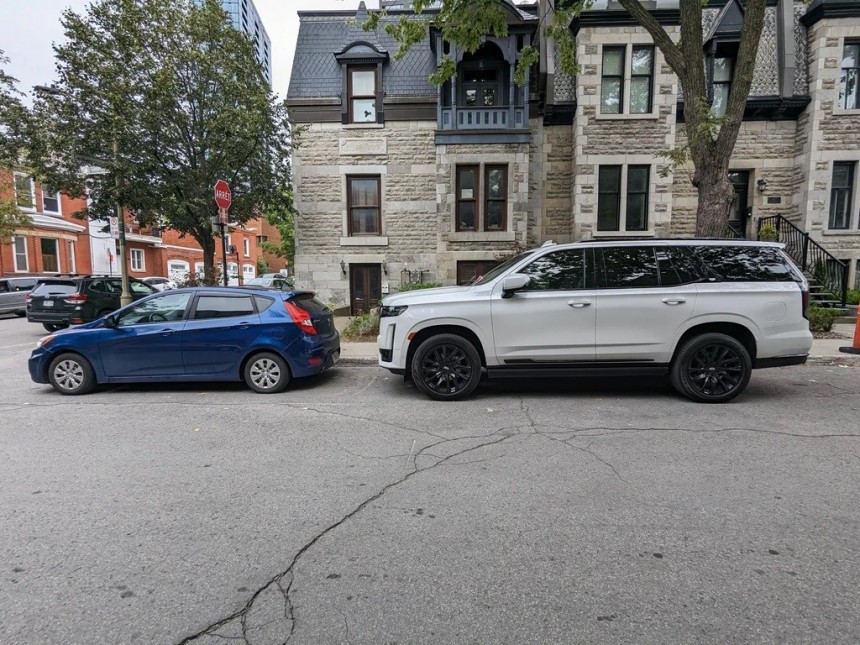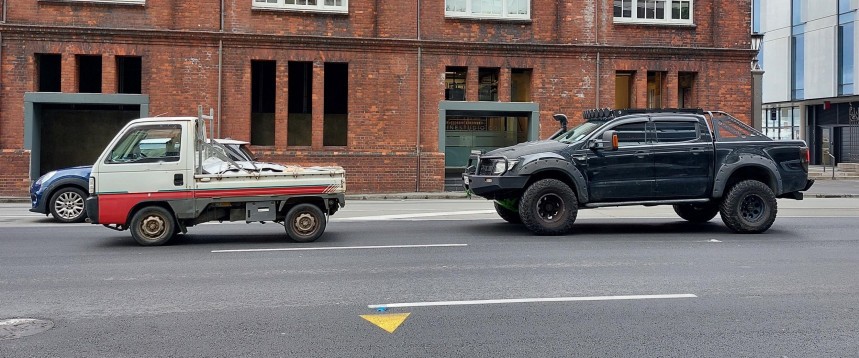Earlier this month, Paris Mayor Anne Hidalgo confirmed that people living in the City of Light (or Love, if you prefer) would be invited to vote on February 24 on a sensitive topic – making parking more expensive for SUV drivers. Here's why it's a great and unbelievably smart initiative. Unless you just bought an SUV to commute to your office in Paris, that is.
Last year, Paris was in the world's top three most congested cities. The average speed was about nine miles per hour. That's half the posted speed limit. Such traffic conditions are horrendous for the local environment because cars emit the most exhaust gases and generate a large amount of brake dust when drivers move slowly from one stoplight to another.
Paris tried to find a solution that didn't imply tearing down historic buildings to add more lanes, and it landed on the Crit'Air sticker. That air quality certificate costs around €4 ($4.4) and helps the authorities automatically identify who must pay extra to drive in certain low-emission zones. When writing, getting it is compulsory in only some cities like Toulouse or Nice.
From 2025 onwards, however, all densely populated places will have to implement low-emission zones and force drivers (no matter if they live there or are visiting) to pay for the Crit'Air sticker and other fees based on their vehicles' emission standards.
But that's not enough to lower transport pollution, which represents almost 15% of the EU's total greenhouse gas emissions. Road transport accounts for over 75% of the total transport emissions, so internal combustion engine-powered vehicles are an issue. And it's not just greenhouse gases that are a worry. The noise is an issue, too!
Paris doesn't want to remain congested and polluted. France's Capital already has problems with various other health-, security-, and cleanliness-related topics. However, the Mayor isn't ready to make drastic decisions by herself. So, Hidalgo decided to involve every citizen in this matter. Parisians will have to vote on February 4 regarding the fate of SUVs.
The public consultation, however, is a double-edged sword. The last referendum took place this year. That's how Paris decided to ban electric scooters. However, that happened after only about 7.5% of the population voted. Still, nine of the 10 people who participated in the public consultation were in favor of putting an end to the scooter-sharing system.
The Mayor didn't say which SUVs will be subject to this increase or how much more expensive the parking fees will be if the Capital's inhabitants vote in the proposal's favor.
Will Paris differentiate between a BMW X5 and a crossover SUV like the X3? Will parking cost more for vehicles like the Mercedes-Benz GLS? Or will the increase target pickup trucks like the Toyota Hilux for the Ford Ranger, too? Will battery-electric SUVs be exempted? Are high-riding hatchbacks like the Hyundai Kona or VW T-Roc going to be included on the no-no list? It remains to be seen.
The best thing about this proposal is that it takes things one step at a time without scaring anybody. There's no risk of a general pushback that could delay the efforts to discourage SUV usage. Local authorities might have enough data to confirm that most SUV owners going through Paris are coming from neighboring towns.
That could have encouraged them to go forward with asking the public about what should be done about bigger vehicles. They might have anticipated a positive outcome that would pave the way for more ambitious public policies.
The issue is the ambiguity of the term "SUV" because it could encompass a plethora of vehicle body types. Can you imagine an Audi A6 allroad quattro falling victim to this change?
The SUV issue is real. This type of vehicle occupies more space, consumes more fuel than a sedan or hatchback, needs larger tires, generates more brake dust, and is not ideal for efficient personal mobility. Even the idea that SUVs can provide enhanced safety for occupants is a bit of a stretch because they have a high center of gravity and can roll easily.
Besides that, most of today's SUVs aren't even true off-roaders. BMW, for example, calls the X5 a Sport Activity Vehicle (SAV). That's more like it, considering that most buyers of high-riding vehicles won't ever take them off the beaten path. The Bavarians are honest about their products. Even pickup trucks have become a status symbol. They're not workhorses any longer.
Then, you have full-on road monsters like the F-150 Raptor R, the XM, the Urus, the DBX 707, the TRX, or the Escalade V. Nobody needs a thirsty V8 hidden under the hood of a large vehicle to move around. However, that's what luxury is all about. When you don't care about the price of gas or how many miles per gallon your car returns, such top-of-the-line vehicles are incredibly attractive.
Well-off car buyers might not be particularly fond of this trend that goes against SUVs and pickup trucks. But the data isn't lying. We can't keep buying these vehicles if we want to truly fight global warming.
But it's not just the CAFE standard that forced the hands of carmakers to focus on crossovers and SUVs. In 2022, almost half of all the new vehicle sales comprised SUVs globally. The US, Europe, and India were the main markets that accelerated this growth.
It's a peculiar move for people living in the Old Continent because Europe is known for having a knack for smaller vehicles. But Americans have always made an impression on our friends over the pond. Units like the Rivian R1T or the Ford F-150 are desired, and some people are willing to put up with the import hassle.
These shifting preferences led to the formation of organizations like the "Tire Extinguishers," who believe that deflating crossover and SUV tires in the middle of the night will convince people to switch back to sedans, hatchbacks, and wagons. They don't care if your SUV is an X5 M or an iX. If it's bigger than a normal car, it's a target. In some cities, they even deflated the tires of crossovers.
In a way, it's understandable. When a 10,000-lb behemoth like the Hummer EV SUV can reach 60 mph in about three seconds, one can only wonder what environmental impact such a "zero-emission" vehicle can have. Is it really greener than a Chevy Suburban?
However, one key difference between the US and most of Europe is the multiple reliable public transportation systems. Subways, trams, buses, and publicly or privately owned trains connect important destinations, and people can depend on them.
What Parisians will decide remains to be seen. But, at the end of the day, one thing's clear: many people want SUVs to become uncool. Gen Z's preferences (and finances) will surely reveal the path forward. Until then, Millennials get to have their fair share of motoring fun. That is, of course, if they can come up with enough money for a pricey SUV or fancy pickup truck.
Paris tried to find a solution that didn't imply tearing down historic buildings to add more lanes, and it landed on the Crit'Air sticker. That air quality certificate costs around €4 ($4.4) and helps the authorities automatically identify who must pay extra to drive in certain low-emission zones. When writing, getting it is compulsory in only some cities like Toulouse or Nice.
From 2025 onwards, however, all densely populated places will have to implement low-emission zones and force drivers (no matter if they live there or are visiting) to pay for the Crit'Air sticker and other fees based on their vehicles' emission standards.
But that's not enough to lower transport pollution, which represents almost 15% of the EU's total greenhouse gas emissions. Road transport accounts for over 75% of the total transport emissions, so internal combustion engine-powered vehicles are an issue. And it's not just greenhouse gases that are a worry. The noise is an issue, too!
Figuring out the best course of action
They won't decide if these vehicles should be banned but vote on drastically increasing parking fees. The hike would apply to both public and private parking offered. The latter includes shopping centers. However, get this: this public policy change will not affect residents who already have a parking permit and own an SUV and the models used by public authorities or emergency services. All Paris residents who register until January 8, 2024, will be eligible to vote.The public consultation, however, is a double-edged sword. The last referendum took place this year. That's how Paris decided to ban electric scooters. However, that happened after only about 7.5% of the population voted. Still, nine of the 10 people who participated in the public consultation were in favor of putting an end to the scooter-sharing system.
The Mayor didn't say which SUVs will be subject to this increase or how much more expensive the parking fees will be if the Capital's inhabitants vote in the proposal's favor.
Will Paris differentiate between a BMW X5 and a crossover SUV like the X3? Will parking cost more for vehicles like the Mercedes-Benz GLS? Or will the increase target pickup trucks like the Toyota Hilux for the Ford Ranger, too? Will battery-electric SUVs be exempted? Are high-riding hatchbacks like the Hyundai Kona or VW T-Roc going to be included on the no-no list? It remains to be seen.
That could have encouraged them to go forward with asking the public about what should be done about bigger vehicles. They might have anticipated a positive outcome that would pave the way for more ambitious public policies.
The issue is the ambiguity of the term "SUV" because it could encompass a plethora of vehicle body types. Can you imagine an Audi A6 allroad quattro falling victim to this change?
The "smart" part
If the public consultation results in pricier parking for SUV owners from outside Paris, then, in a few years, elected officials could bring forward even more stringent anti-SUV measures. They could also decide on expanding the low-emission zone to cover the entire city, just like London did.Besides that, most of today's SUVs aren't even true off-roaders. BMW, for example, calls the X5 a Sport Activity Vehicle (SAV). That's more like it, considering that most buyers of high-riding vehicles won't ever take them off the beaten path. The Bavarians are honest about their products. Even pickup trucks have become a status symbol. They're not workhorses any longer.
Then, you have full-on road monsters like the F-150 Raptor R, the XM, the Urus, the DBX 707, the TRX, or the Escalade V. Nobody needs a thirsty V8 hidden under the hood of a large vehicle to move around. However, that's what luxury is all about. When you don't care about the price of gas or how many miles per gallon your car returns, such top-of-the-line vehicles are incredibly attractive.
Well-off car buyers might not be particularly fond of this trend that goes against SUVs and pickup trucks. But the data isn't lying. We can't keep buying these vehicles if we want to truly fight global warming.
The first step is admitting we have a problem
In the US, the Corporate Average Fuel Economy (CAFE) standard made it easier for automakers to prioritize bigger cars because the mileage targets are more relaxed. Ford, for example, discontinued every sedan apart from the iconic Mustang.It's a peculiar move for people living in the Old Continent because Europe is known for having a knack for smaller vehicles. But Americans have always made an impression on our friends over the pond. Units like the Rivian R1T or the Ford F-150 are desired, and some people are willing to put up with the import hassle.
These shifting preferences led to the formation of organizations like the "Tire Extinguishers," who believe that deflating crossover and SUV tires in the middle of the night will convince people to switch back to sedans, hatchbacks, and wagons. They don't care if your SUV is an X5 M or an iX. If it's bigger than a normal car, it's a target. In some cities, they even deflated the tires of crossovers.
In a way, it's understandable. When a 10,000-lb behemoth like the Hummer EV SUV can reach 60 mph in about three seconds, one can only wonder what environmental impact such a "zero-emission" vehicle can have. Is it really greener than a Chevy Suburban?
However, one key difference between the US and most of Europe is the multiple reliable public transportation systems. Subways, trams, buses, and publicly or privately owned trains connect important destinations, and people can depend on them.
What Parisians will decide remains to be seen. But, at the end of the day, one thing's clear: many people want SUVs to become uncool. Gen Z's preferences (and finances) will surely reveal the path forward. Until then, Millennials get to have their fair share of motoring fun. That is, of course, if they can come up with enough money for a pricey SUV or fancy pickup truck.
